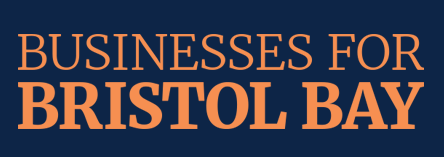Businesses and chefs call on EPA for Clean Water Act protections of world’s largest wild salmon fishery in Bristol Bay
Washington, DC - This week, business leaders are in Washington D.C. to deliver a letter to the Environmental Protection Agency (EPA) with more than 450 businesses signed on in support of the EPA’s Clean Water Act Section 404(c) Proposed Determination for Bristol Bay’s wild salmon fishery - the largest in the world. The Businesses for Bristol Bay coalition, Conservation Alliance, and American Sustainable Business Network submitted the letter to the EPA during their recent public comment period for a new series of protections for Bristol Bay, Alaska against the proposed Pebble Mine.
The EPA’s recent public comment period is the seventh that the EPA has held regarding protection of Bristol Bay’s salmon fishery from the Pebble Mine. During this summer’s comment period, the EPA heard from more than 500,000 Americans urging them to finalize its proposed protections.
Business signers included members of the food service and retail industries, including Whole Foods Market and Publix, as well as the outdoor recreation and sport fishing industries, including YETI, Patagonia, MeatEater, and Grundéns.
This summer, Bristol Bay saw a record-breaking return of more than 78 million sockeye salmon, smashing last summer’s record-breaking run of 67 million sockeye. With many wild salmon stocks around the world declining due to habitat loss and climate change, Bristol Bay’s salmon fishery supplies over half of the world’s wild sockeye salmon and is Alaska’s largest and most valuable wild salmon fishery. In recent years, Bristol Bay’s salmon fishery supports more than 15,000 American jobs and generates $2.2 billion in annual economic activity.
In the letter delivered to the EPA on September 5th, more than 450 businesses called on the Environmental Protection Agency (EPA) to “move swiftly to finalize Clean Water Act 404(c) protections that are durable and ensure the long-term sustainability of Bristol Bay's wild salmon runs.”
“Bristol Bay is a shining example of what a renewable, sustainable economy can look like. But it can only exist if we protect the clean water and habitat that Bristol Bay’s salmon need to thrive. That’s why more than 450 businesses from across the country are asking the EPA to finalize its Clean Water Act protections for Bristol Bay and block the Pebble Mine from ever being developed. It’s time for the Biden Administration to finish the job that the EPA started in 2014 so that Bristol Bay’s tribes, fishermen, and businesses can have certainty and stability long into the future,” said David Levine, President of the American Sustainable Business Network.
“The fly fishing and broader outdoor recreation industries have been in the ring for a long time in this fight, but it’s not over. We will remain engaged until Bristol Bay is protected. This region represents bucket list outdoor experiences for recreationists from across the globe and provides economic benefits for companies from Bristol Bay to all corners of the country. The EPA can and must finalize durable Clean Water Act protections for Bristol Bay, and hundreds of American businesses are urging the agency to do so this year,” said Jim Bartschi, President of Scott Fly Rod Co. and Board Chair of the American Fly Fishing Trade Association.
“Bristol Bay is a top priority for the Conservation Alliance. Our 270 business members have provided funding to groups on the ground and advocated for protections in this area for over a decade. We are honored to join forces with the 450 businesses nationwide who are calling on the EPA to protect the 15,000 jobs and billions in annual economic benefits that come from the Bristol Bay fishery. Now is the time for the Biden Administration to listen to business leaders and stand with our Alaska Native partners in Bristol Bay as we work to stop Pebble Mine,” said Shoren Brown, Interim Executive Director at the Conservation Alliance.
In addition to the national business letter, dozens of chefs sent a letter to the EPA echoing support for long-term protection of Bristol Bay under the Clean Water Act. In their letter, they stated: “As culinarians leading the sustainable seafood movement, we believe that the EPA must safeguard Bristol Bay in perpetuity.”
“As the planet’s most prolific source of sockeye salmon, the waterways of Alaska’s Bristol Bay provide an irreplaceable, wild resource for the American dinner table. I want to see these fisheries given the highest level of protection,” said Rick Moonen, author and Master Development Chef for Perry’s Restaurants in Las Vegas.
“Long before anyone thought of mining the headwaters of Bristol Bay, this renewable resource sustained Alaska Native communities. Just as it does to this day. Protecting the fishery, the people it supports, and the quality seafood it supplies is a top priority for me and the culinary community,” said Michael Cimarusti, Owner and Chef of Providence and Connie and Ted’s in Los Angeles.

